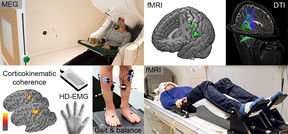Holding an object requires smooth interaction between high and low brain frequencies
Researchers have identified a neuronal mechanism enabling people to maintain constant contraction force.

We study structure and function of the healthy and diseased human sensorimotor system. We use magnetoencephalography (MEG), functional magnetic resonance imaging (fMRI), diffuse tensor imaging (DTI), electroencephalography (EEG), electromyography (EMG), and various biomechanical signals (force, acceleration, 3D-motion tracking etc.). Our current focus is on proprioceptive system (‘movement sense’), but we are interested on all sensory modalities. The sensorimotor system is the basis for human interaction with the environment, and thus some of our studies are focused on social interaction, cognition, embodiment, etc.
Our primary research questions
Researchers have identified a neuronal mechanism enabling people to maintain constant contraction force.
The funding is especially geared towards early-career researchers.
The Research Council decided to grant Academy Research Fellow salary funding to 11 applicants for the period 1 September 2016 ‒ 31 August 2021.